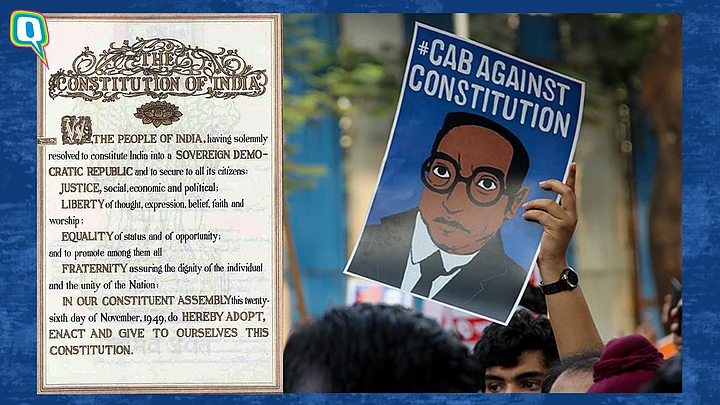It wouldn’t have been easy to bring 550 independent princely states together – people speaking over 30 languages, praying to different gods, practicing distinct lifestyles, of different religions and class.
“India is the world’s most complex and interesting democratic experiment,” once said Dnyaneshwar Mulay, former Consul General of India, USA. This was made possible by the faith that this nation’s leaders and its residents put in the Indian Constitution.
It is this "Samvidhaan” (Constitution) which was named the Oxford Hindi Word of 2019 by the Oxford University Press (OUP). And if any word could encompass the turmoil, anguish and the contemporary mood in India, it’s “Samvidhaan.”
A word, which I feel, is in great danger.
Why The Indian Constitution is Sacred
Nationwide anti-CAA and anti-NRC protests have brought the people of our country together to disapprove of unjust laws.
While some braved lathicharge, harsh weather, and many were injured and killed, others faced questions on their identity. But despite the dangers, why are people out on the streets? Why are the women of Shaheen Bagh not moving? Why do they sit outdoors on chilly nights chanting slogans? Here’s why.
While the world gawked at India’s attempt to unite a population of 780 million people after a painful Partition, the Indian constitution presented itself as a solution to our dynamic country. It allowed people of multiple religions and faith to co-exist.
At a time when most countries had constitutions that were rigid and not open to changes, our Constitution arose as a living document. A document that is versatile and possesses the ability to respond to different voices, new ideas and changing times.
I feel that the constitution is workable, it is flexible and it is strong enough to hold the country together both in peacetime and in wartime. Indeed, if I may say so, if things go wrong under the new Constitution, the reason will not be that we had a bad Constitution. What we will have to say is that Man was vile.Dr B.R. Ambedkar, 1948: In November, concluding his speech after the Draft Constitution was formally introduced to the Constituent Assembly.
Leaders who developed the Indian constitution back then, were true visionaries. They were aware of the need to have a malleable Constitution. And even though our Constitution was adaptable, it was designed to not give undue advantage to any one single group — ensuring an equal distribution of power and a system of “checks and balances.”
But today in 2020, we stand on the brink of a new struggle. A struggle which challenges the ethos of our Constitution. A struggle which is actively killing the spirit of this living document.
Reading The Preamble As a Student
The Preamble of the Indian constitution was printed in my school almanac. I would read it almost daily, as I flipped through the book. As the years went by, the meaning of every word in that document became clearer for me.
It became something that me and my peers took immense pride in – because despite the hardship that India faced, the Preamble reminded us why we stood tall. It made every Indian believe that this country was their home. They belonged here and irrespective of where they came from, they would be treated justly.
In 2020, it breaks the heart of many Indians to see how the values in the Preamble don’t resonate across the nation. Especially, among political parties who are responsible for protecting the sanctity of the Constitution.
Our Constitution is being treated like a piece of paper, which can be tampered to aid the well-being of those in power.
India Asks, What is Our Democratic Right?
What is our democratic right when we fear being called “seditious,” if we raise our voices in dissent? What is our democratic right when innocent students get hurt and perpetrators go free without a scratch? How must we educate new students who may read the Constitution now and feel nothing? Because none of those words in the Preamble make sense in this “New India” they find themselves in?
In light of the existential ultimatum that the Indian Constitution faces, what’s left to see is whether once again, the words which resound in the Preamble, will make sense to those who are fighting to save it — whether the notions on which the Indian Constitution was built on still holds.
